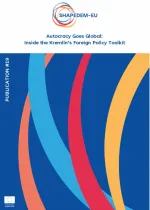Autocracy Goes Global: Inside the Kremlin’s Foreign Policy Toolkit

SHARPEDEM-EU publication 19
This case study explores the multifaceted ways in which Russia exerts autocratic effects abroad, with a particular focus on the Eastern and Southern neighbourhoods of the European Union. While Russia does not explicitly promote autocracy as a normative project, its firmly established authoritarian regime influences neighbouring and strategically important regions through a diverse set of mechanisms. The study outlines four dimensions of this influence: (1) autocracy support, where Russia safeguards embattled autocratic regimes (e.g., Belarus, Kazakhstan, Syria); (2) democracy resistance, leveraging economic, security, and subversive tools—including disinformation, secessionist conflicts, and military intervention—to undermine democratic transitions (e.g., Ukraine, Georgia, Moldova); (3) autocracy promotion by example, wherein Russia’s governance model, legal restrictions on civil society, and promotion of traditionalist values are emulated by other regimes; and (4) autocracy promotion through regionalism, via Russia-led organisations such as the CSTO, EAEU, and CIS, which reinforce authoritarian stability through legitimisation, legal harmonisation, and discursive coordination.
Drawing primarily on developments from 2010–2021, with contextual references to earlier and later events, the study highlights the behavioural and discursive instruments Russia employs to undermine democratisation and maintain authoritarian influence. It argues that Russia’s actions have not only contributed to democratic backsliding within its immediate vicinity but also pose a structural challenge to EU democracy support strategies. The paper concludes that addressing these autocratic effects requires the EU to recalibrate its democracy support by integrating counter-autocracy measures across policy domains, enhancing resilience to authoritarian regionalism, and promoting alternative democratic regional networks.